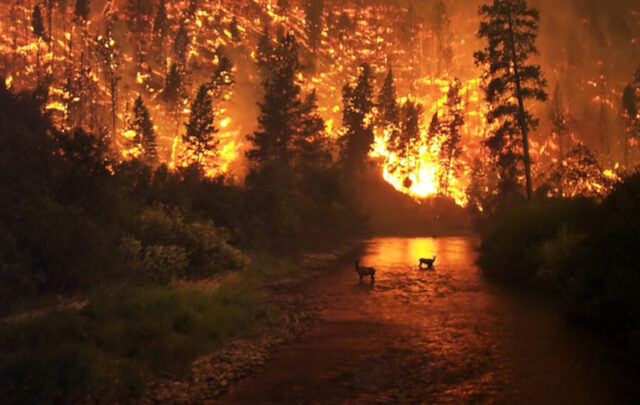Both societies and individuals rely on feedback mechanisms to function. For example, humans balance on one foot not by rigidly holding the leg and foot steady. Rather, they constantly slightly shift their weight to keep upright. If they close their eyes, however, they have less feedback, and it becomes harder to maintain balance.
Now, the stakes are somewhat higher when you drive a car, but the principle is the same. When driving, you don’t simply hold the wheel in one position. That would eventually send you off the road or into another car. Instead, based on visual feedback from the lines painted on the road and the positions of other vehicles, you steer your car, making frequent slight adjustments to keep you on the road, in your lane and away from collisions.
If, on the other hand, you were forced to drive with a paper bag over your head, you’d lack all that feedback and you’d be lucky if you only ended up going off the road into a ditch.
But our situation as a civilization is so much worse than that. Collectively, most of us are “drivers” of our civilization who have bags over our heads without understanding that we have bags over our heads. At least a lone driver of a car quickly realizes he or she is in trouble when the car hits another car or goes into a ditch. Collectively, as actors in our broader civilization, we are getting feedback that all is well, or at least well enough, that we don’t need to make any drastic changes in our way of life. It’s as if someone is beaming a false virtual reality to us inside the bag. And, that is a good metaphor for what’s actually happening.
How is this virtual reality constructed? The obvious answer is through the news and entertainment media and those who control it—which is mostly the wealthy. Another entrant is social media which seems to have liberated individuals to become part of the story. In reality, the same elites who control the news and entertainment media also control social media. As private companies, they shape what we see, hear and read through algorithms which embody the values and goals of the elites who own and run social media companies.
Perhaps the most important trick to managing what we see, read and hear is to make sure we either cannot get information that contradicts the dominate narrative (i.e., that everything is basically fine) or we cannot understand that information and its implications.
It turns out this is an easy trick to perform because the relatively fine division of labor in modern society makes it impossible for any one person to understand the vast complexities of the modern globalized system. A peek at information and analysis which challenges the dominate narrative will seem incomprehensible to most people without a significant amount of preparation. If information about our environmental and social predicament leaks out, it’s not such a big problem for those who don’t want the leaks. Few people will understand anyway.
We as a global society are getting plenty of feedback. The climate is changing radically and causing destruction of property and havoc with water supplies and crops. The toxins released into the environment are fundamentally undermining the health of the entire population of the earth and the animals as well. The increasingly rapid depletion of finite resources such as metals and fossil fuels is driving long-term costs higher and threatening to undermine the very basis of modern civilization, cheap and abundant energy and the machines that use that energy.
The key for the industry spin doctors is to reframe this feedback, and they have done a splendid job. The most obvious reframing regards climate change. The industry climate narrative is essentially patterned after the famous dog bite defense, to wit: My dog doesn’t bite. That wasn’t my dog. And furthermore, I don’t have a dog. For climate denier professionals the pattern is inverted and runs as follows: There is no climate change. Humans aren’t causing climate change so there’s nothing we can do about it. And furthermore, climate change is good for us.
The fact that these arguments are not entirely consistent with one another doesn’t matter. Listeners can take their choice. And, the whole purpose anyway is to confuse people so they won’t take action.
This pattern of reframing is similar when talking about toxic chemicals and depletion of resources. Regarding toxic chemicals, one favorite mode of deflection is to focus on the treatment of cancer—because no one thinks we shouldn’t treat cancer—rather than on its prevention through strict environmental rules preventing the use and release of toxic chemicals.
In non-mass societies, societies in which humans aggregate in small groups, it easier to tell whether someone is lying. And the skills and activities for getting a livelihood—hunting, gathering and farming—are usually widely distributed and understood. Feedback from the environment—its flora, its fauna and its inanimate resources and forces—is immediate, and that feedback is witnessed and more easily understood by all members of the group.
Returning to the present, we have one more complication and layer of obfuscation coming to us courtesy of artificial intelligence (AI). AI is being touted as a creative force that can solve the major threats we face. But given how much of the information available for AI training is generated by industry PR apparatchiks and their allied academic researchers financed by industry money, the situation really amounts to garbage in—garbage out.
But the situation is actually worse than that as I pointed out last year: “AI source material comes from the internet where soon much of the material posted will come from AI.” Author Nassim Nicholas Taleb called this arrangement “progressively a self-licking lollipop.” The very poor quality feedback we are currently getting on the internet from industry PR apparatchiks will degrade even further through the self-reinforcing loop of AI feasting on AI-generated content based on industry PR.
As I mentioned above, if you are driving with a bag over your head, about the best you can hope for is to drive off the road and stop when you realize something is wrong. But the results of steering our civilization with bags over our heads are not likely to be so benign.
There is always the possibility that my fears about the probable collapse of global civilization in the not-too-distant future—I actually think the collapse is in progress and inching along for now—may turn out to be misplaced. Then, this piece and much of what I’ve written in the past 20 years will become just another part of the garbage in-garbage out AI juggernaut.
But then again, the energy- and resource-intensive infrastructure that AI requires to function may not survive long enough for that to happen.






